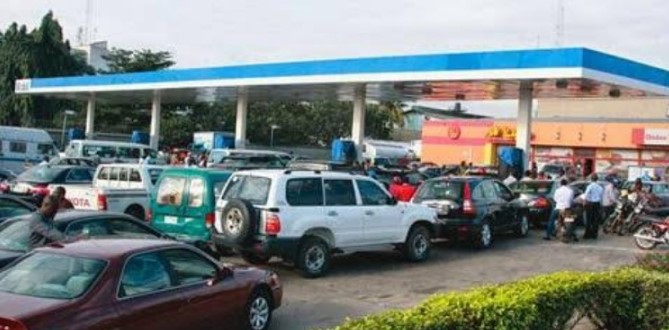Fuel scarcity continues to worsen in Lagos, Ogun State, Abuja, and some other parts of the country despite claims by the Nigeria National Petroleum Corporation (NNPC) Limited that all issues have been resolved.
Recall that last week, the spokesperson for NNPC, Olufemi Soneye, issued a press release stating that all factors responsible for fuel scarcity had been resolved, and there is an excess supply of petrol in the country.
However, Nairametrics observed that in Lagos, fuel stations are selling petrol for as high as N850 to N900 per liter in locations such as Maryland, Ikeja, Agege, Iyana Ipaja, and other outskirts of Lagos.
In Abuja, Nairametrics observed long queues at filling stations along Abuja Airport Road, Lugbe, and Nasarawa-Abuja Road.
In addition, black marketers stood along the way, selling to wearied motorists for as high as N1,500/per liter.
Recommended reading: Fuel scarcity: NNPC not supplying us with products – Oil Marketers
Filling Stations Shuts their Doors, Queues Intensify
Nairametrics observed a concerning trend of most filling stations closing their doors, while those that remained open often refused to serve individual customers and motorists. This reluctance compounded the challenges faced by consumers seeking fuel in areas such as Agege, Ikeja, Ogba, and Ikotun in Lagos.
Remarkably, the few operational stations in these regions resorted to selling fuel at inflated prices, reaching as high as N850 to N900 per liter, reflecting the heightened demand amid the scarcity.
Nairametrics observed that the escalating demand for fuel prompted extensive queues, exacerbating the situation in various parts of Lagos and its neighboring states.
In locations like Ikorodu, Sango, and Mowe the outer parts of Ogun State, the impact of the scarcity was particularly pronounced, with motorists facing prolonged waits in line.
During the early hours of Monday in Lagos, commuters were observed patiently awaiting buses to convey them to their respective workplaces.
However, with the persistent fuel scarcity, transportation costs surged significantly, with motorists and okada riders doubling their fares in areas such as Ogba, Ikotun, Berger, and various other locations across the city.
This abrupt increase in transport charges added to the burden faced by commuters already grappling with the challenges posed by the ongoing scarcity.
Speculations around Increase in Price
For marketer operators and experts who spoke to Nairametrics, there are speculations around imminent increase in price of PMS, leading to excessive hoarding, panic buying, among other things.
- “The oil and gas sector is very fragile. It thrives on rumours and speculations. And if there is information that prices may go up, many marketers will not supply what they have in stock.
- Remember the federal government pegged the oil price to N617/per liter despite the strong Dollar, and imported fuel is priced in Dollar. So, if Dollar is up, prices will go up. In my opinion, fuel ought to be selling around N900 to N1,200/per liter, but the government pegged the fuel and is still paying subsidy,” Ayodele Oni, an oil and gas expert told Nairametrics.
Disparity in Rates
Energy analyst and key stakeholder, Kelvin Emmanuel, attributed the fuel scarcity to discrepancies between the delivery prices for the Independent Petroleum Marketers Association of Nigeria (IPMAN) and Major Oil Marketers Associations of Nigeria (MOMAN), stemming from the federal government’s price cap.
- “I think the only equalizer the government had was Dangote Refinery, but the risk is that with the inability of NNPC to meet up with domestic crude oil supply obligations for commercial refineries, it might be difficult to have significant cost reductions as expected.
- “Moreover, Dangote is going through a technical capability test for License to Operate and will need another month or two to start producing lighter transportation fuels like premium motor spirit,” Emmanuel said.
According to reports, IPMAN indicated that the prevailing scarcity of petrol could persist for an additional two weeks.
Chinedu Ukadike, the Public Relations Officer of IPMAN, made this assertion on Sunday in response to the widespread shortage of the product affecting numerous states.
Ukadike told newsmen that the product is currently not available in the country, saying it is a challenge sourcing it because most refineries in Europe are undergoing turnaround maintenance.
- “I also have it on good authority that most of the refineries in Europe are undergoing turnaround maintenance, so sourcing petroleum products has become a bit difficult.
- “NNPC Group CEO has assured us that there will be improvement in the supply chain because their vessels are arriving.
- “Once that is done, normalcy will return. This is because once the 30-day supply sufficiency is disrupted, it takes two to three months to restore it”, he said.
What NNPC said
Earlier, Nairamterics reported that NNPC attributed the recent scarcity of fuel in some regions of the country to logistical problems impacting the distribution of the product in those areas.
The spokesperson of NNPC, Olufemi Soneye, made this disclosure in a statement on Thursday in Abuja.
Soneye, however, stated that the logistics issues have been fully resolved, and added that there will now be fuel availability in those regions.
He also warned against panic buying of petrol as there is no shortage of fuel in the country.
- The Nigerian National Petroleum Company Limited (NNPC Ltd.) wishes to clarify that the tightness in the supply of Premium Motor Spirit currently being experienced in some areas across the country is as a result of logistics issues and that they have been resolved.
- “It also wishes to reiterate that the prices of petroleum products are not changing.
- “It urges Nigerians to avoid panic buying as there is a sufficiency of products in the country,” Soneye said
- However, despite these assertions made on Thursday, Nairametrics observed over the weekend and into the early hours of Monday that fuel scarcity continues to prevail across the country.
- Notably, calls and a text message sent to Olufemi Soneye, NNPCL spokesman, to provide clarifications on the issue were not responded as at press time.

















